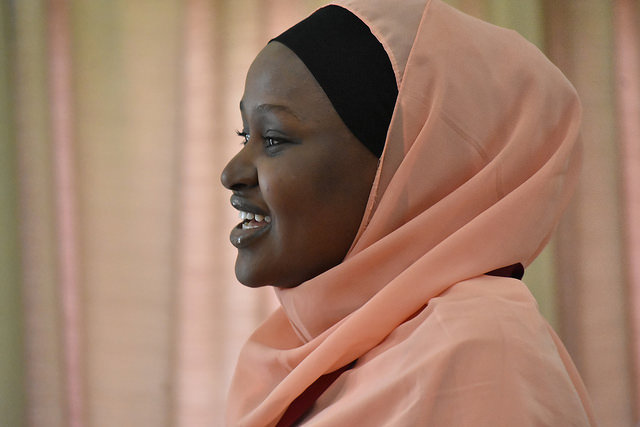
When I was first accepted to join the African School on Internet Governance (AfriSIG), I thought that it would be a dense, academic course, with tech experts and policy makers coming together to discuss issues around internet governance. Coming from a non-tech, civil society background (my work is on curbing hate speech in Nigeria through online reporting and countering), I arrived at AfriSIG as a novice to the internet governance table. My perception was that internet governance is all about monitoring and governing content online with a focus on data privacy. With its emphasis on multistakeholder approaches, however, the school was much more interactive and open than I anticipated. And, thanks to the AfriSIG faculty, I now have a much broader perspective of what internet governance entails.
The school began with an overview of the internet itself and how it works. We learned about the role of ICANN in managing the internet for public benefit through the use of names and numbers to locate each end user of the internet (e.g. the TLDs, ccTLDs, gTLDs, etc.). Oops, I am beginning to use techie acronyms! For the benefit of non-techie readers, ICANN stands for Internet Corporation for Assigned Names and Numbers, and TLDs stand for the top level domains which follow the final dot in an internet address. TLDs identify the purpose or affiliation of the website. ccTLDs stand for country code TLDs which identify the country the website is associated with (e.g .us, .fr, .ng, etc.), and gTLDs stand for generic TLDs, which are most commonly used and registered by individuals (e.g .com, .org, .edu, etc.).
After getting a clearer picture of how the internet works, we turned to internet governance as the key discussion topic. What does the internet governance ecosystem look like? Which stakeholders are involved at a national, regional and global level? The concept of multistakeholderism came to the forefront here, as we started an open discussion about internet issues and processes in various countries. Fellows shared their perspectives on what works well in terms of internet governance and what does not. This is when I realised that internet governance issues are more interesting, complex and important than I expected.
We also had multiple presentations and discussions on cybersecurity and data protection, which I found especially interesting because they explored the issue of privacy online. We reflected on two important documents: the African Union Convention on Cyber Security and Personal Data Protection, which is the legal framework adopted by the African Union to regulate issues of cybersecurity and data protection in Africa, and the General Data Protection Regulation (GDPR), which is an EU law regulating data protection and privacy for all individuals within the European Union and the European Economic Area. You might be wondering what the latter document has to do with Africa. In fact, it is more relevant than you’d think, because the policy requires that Africans conducting business with EU countries must also comply with the GDPR, whether or not they are based in an EU country. Exploring the challenges and critical areas of data protection in Africa, and the implications of these two policies, made for a rich discussion amongst the group.
Another important topic of discussion during the week was the intersection of gender and internet governance, and the need for inclusion of a gender perspective in internet governance approaches. Faculty presented on the issue of access for women and girls in the internet space, and Research ICT Africa delivered a presentation on the general state of internet infrastructure and access in Africa. This was followed by country-specific updates on multistakeholder approaches to internet governance, in which fellows from different African countries shared experiences, successes and challenges of each national Internet Governance Forum (IGF). This particular session gave me insight into the IGF situation in my own country, Nigeria. So far, the Nigerian IGF (NIGF) has taken quite an effective multistakeholder approach by including input from various stakeholders and some key civil society organisations as well as incorporating lessons learned from other countries.
Did I mention the practicum and the two-day pre-training workshop on approaches to effective collaborative multistakeholder discussions? These experiences were also excellent and provided me with further exciting opportunities to be at the table of multistakeholders and try to reach consensus on issues pertinent to internet governance.
The combination of the contextual experience of the school, the pre-workshop training on multistakeholderism and the hands-on practicum, not to mention hearing the inspiring story of Rebecca, a young Tanzanian woman who coordinated and championed the inaugural Tanzanian School on Internet Governance, awakened my can-do spirit. I’m looking forward to going back to my country and collaborating with various stakeholders and existing structures to make an impact in our national IGF. My organisation has already identified the inclusion of women in internet governance as a key area of intervention, and taken the bold step to incorporate women into the NIGF by organising the first women-led IGF in Nigeria.
On this note, I’d like to end with a message of appreciation to all the AfriSIG organisers for giving me the chance to attend the school, and to all the AfriSIG faculty and fellows for a highly formative experience and knowledge-sharing exercise that I will carry with me always. Thank you.
Zahra Yunusa Ya’u is from Kano State of northwestern Nigeria. She works with the Centre for Information Technology and Development (CITAD), a non-governmental organization based in Kano State, Nigeria. She is most interested in improving women’s access to internet, ending the digital discrimination and marginalization of women and struggling to see that women make at least half of the internet regulator and decision makers globally. She is interested in travel and in touching lives.
